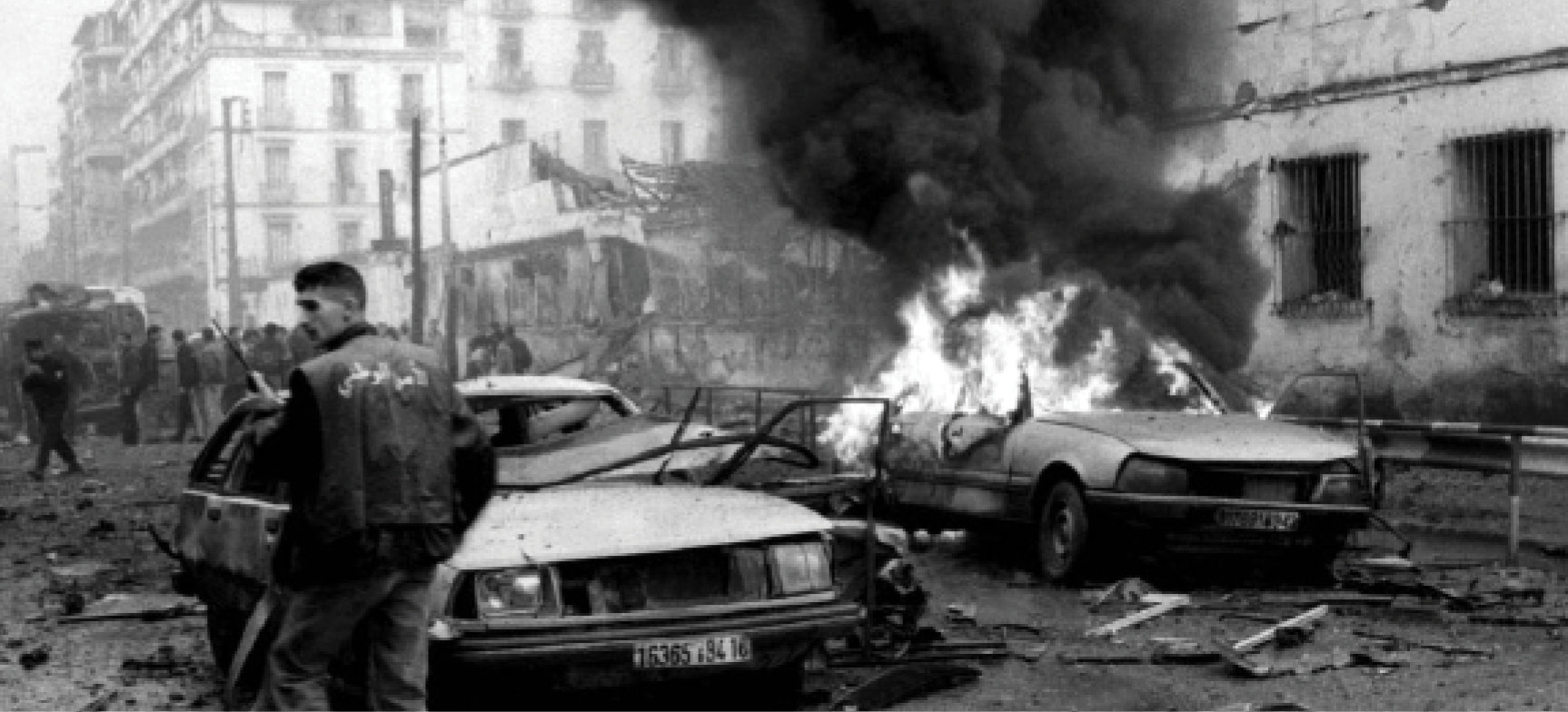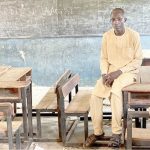The 1990s was aptly tagged the ‘Black Decade’ in Algeria. It was not just black, it was deadly and pernicious. It was a decade of fire and brimstone when terrorists’ fire engulfed the country from Algiers, its capital city, to rural and isolated communities.
Riding on the wings of warped Islamic doctrines, the Armed Islamic Group (GIA-led) extremist groups committed massacres, burnt buildings and public infrastructure, and orchestrated mayhem beyond the control of the law, political leadership and the military.
- Buhari orders flag to fly at half-mast, declares holiday for armed forces
- ‘Dining with the devil’: How villagers co-habit with bandits
The mujahideen slaughtered government officials, members of the security forces, journalists, feminists, intellectuals and French-speaking individuals in what appeared to be a bid to eliminate the educated class that, according to them, had been contaminated by Western values. They killed school teachers, soccer fans, tourists from the West, moderate Muslims, women, politicians, among other forms of outrageous brutality that made the country to recede to primitive age of savagery.
In Algeria’s struggle against terrorism, some 150,000 people lost their lives, and the country sustained some $30 billion in material and infrastructural damage. The root cause of the terrorist fanaticism could be linked to the over-indulgence of extremist elements in the name of Arabization of Algeria from French culture, but it took strategic and decisive steps by government and the military to overcome the ubiquitous terrorists.
Below are seven of the several steps from which Nigeria could learn lessons to defeat bandits and terrorists.
Border control
One of the steps taken by Algeria in dealing with violent activities of terrorists in the ‘black decade’ was to properly police its borders with neighbouring countries. The country’s 2,400 kilometres (1,500 miles) of borders between Morocco, Tunisia, and Libya were clearly demarcated, such that entry and exit were closely monitored, making its infiltration by terrorists very difficult. The effectiveness of the country’s border control is evident in the fact that though Algeria shares borders with Libya, fighters from Libya have not infiltrated Algeria to cause mayhem. But Nigeria, which does not have a direct border with Libya, blames the activities of bandits on the weapons and fighters from Libya.
In Nigeria, most bandits come in through our porous borders in the Sahel region, but not enough effort is being put into policing them. Unless border control is diligently enforced, terrorists and bandits would enjoy a thoroughfare into Nigeria to wreak havoc and smooth exit to their homeland. It is not only Nigeria’s border with neighbouring countries that is porous. Almost all borders in the Sahel region are porous, and they are linked with Algeria. However, with effective management, Algeria has prevented Taureg fighters who constitute the menace in the region up to West Africa from entering into the North African country.

Increased military spending
During the ‘black decade,’ Algeria increased its military spending by over 176 per cent, as it engaged in mass recruitment into its army and the acquisition of high-calibre weapons from Western countries. Its total annual spending was put at $10.4 billion (an equivalence of N5 trillion) during the war years. Even today, Algeria has a standing force of 520,000 active fighters and 272,350 on reserve, making a total of 772,350 soldiers. Algeria’s population is put at 43.9 million, as of 2019.
Nigeria, with a population of over 200 million, has about 120,000 fighters, in spite of the multiplicity of bandits and terrorists across the country. That is to say, Algeria with a quarter of Nigeria’s population has a standing army that is almost four times the size of Nigeria’s. This, in part, explains why Nigeria’s army is over-stressed and overwhelmed by bandits and terrorist attacks. Nigeria’s military spending is overshadowed by hide-and-seek schemes and corruption. Even the $1 billion approved by governors and the National Assembly a couple of years ago for the purchase of weapons to fight terrorists is yet to be genuinely accounted for.
Though Algeria is not fighting any battle today, its military expenditure ($13.9 billion in 2021) is the third highest in Africa, after Egypt and Angola. All things being equal, Nigeria’s military budget should be the highest in Africa today, given the types and size of insecurity that has infested the country.
Creation of patriots and self-defence groups
Apart from its regular army, Algeria created what it called patriots and self-defence groups, and equipped them with weapons to defend their communities against terrorists. The groups were called “patriotic militia” or local self-defence groups. In every municipality, there were over 10,000 of them, and the total number was put at over 100,000 Algerian volunteers who complemented the activities of the army against terrorists.
In Algeria, the “patriotic militia” became very strong and were feared by terrorist groups. In Nigeria, there is a consensus that the country is ripe for the establishment of such self-defence groups to tackle bandits and terrorists, but government has not taken a positive step in that direction. State governors, due to frustration from the federal Nigeria Police Force, are asking to be authorized to set up state police and acquire weapons for them. But the body language of President Muhammadu Buhari does not support the move. Though there is the Civilian Joint Task Force in Borno State, Amotekun in the South-West, and Ebube-Agu being established in the South-East, their activities have not been given the desired legitimacy and confidence for them to operate against bandits and terrorists optimally. They are not permitted to bear sophisticated weapons that would enable them to confront terrorists and bandits.
Without such self-defence outfit, rural and isolated communities in Nigeria are vulnerable to attacks by bandits and terrorists but lack the weapons to defend themselves, even when they have the courage to challenge the criminals.
Elite consensus
During its years of struggle against terrorists, the government brought together the elite in the society, among them political leaders, religious leaders, civil society organisations, youths, community leaders and other elements considered as stakeholders to build a consensus that the people must reject the objectives, strategies and activities of terror groups. The mobilization was so effective that Algerians rejected extremist ideologies propounded by terror groups and opposed political leadership based on such ideologies, especially the Islamic Salvation Front (FIS) which won the 1992 election through extremist rhetoric. This way, extremists lost the sympathy of the people.
In Nigeria, there is hardly elite consensus about the current insecurity, as it is being viewed from regional and political perspectives. A segment of the society is granting terrorists unsolicited amnesty or pardon, paying ransom in the name of carrot and stick, while others are opposed to any form of negotiation with the criminals. Political leaders are not on the same page about what should be done to deal a deadly blow to these terrorists. There are many conspiracy theories that underscore mutual suspicions between the North and South. It is even feared that elements in the military have compromised their operation and maybe in bed with terrorists and bandits. Under this chaotic atmosphere, it will be difficult to defeat these criminals who are gradually rendering Nigeria ungovernable.
Control of religious discourse
One of the bold measures taken by Algeria, and which has helped in reducing the activities of Islamic extremists, is the effective control of religious discourse, which in a nutshell was the prohibition of radicalization messages. A policy was put in place to vet what was preached by clerics and the contents of the curriculum of Islamic schools at all levels. Religious preachers were forbidden from engaging in political activism or rhetoric and made to rather focus on personal religious practices.
Deliberately, the government worked with moderate Islamists to counter extremist doctrines of radical Islamic sects. At the moment, there are fire-brand preachers whose rhetoric is similar to that of Boko Haram; they preach against government, the West and other religious groups, but security agencies have not stopped them, mainly because government has not summoned the political will to tackle their division and dangerous religious discourse. At this rate, it will be near-impossible to eradicate Islamic radicalism and even terrorism in the near future.
Compensation for victims of terrorism
In Algeria, victims of terrorist attacks received support from government. This included financial and legal support. With regard to the latter, Algeria promulgated an Act that stipulated that victims should automatically have legal aid, such that “victims of acts of terrorism are exempt from paying fees such as for lawyers, clerks and notaries. Free legal assistance is also granted to victims’ dependents.” There was financial compensation to families of the dead and persons missing, to help heal their wound. This step gave the people a sense of belonging and drew them closer to government.
In Nigeria, government has set up Internally Displaced Persons (IDPs) camps, but the facilities are too inadequate to win the appreciation of victims of terrorism. Worse still, there is no reliable statistics on the number of deaths that have occurred as a result of terrorist activities, not to talk about compensation for their families. Government and the military need to do a lot more to give victims of terrorism a sense of belonging. When bandits abduct people, the police and security operatives are expected to be in the lead in tracking down the criminals, but victims’ families are abandoned to negotiate ransom payment with those criminals. The government is seen to go into hiding when citizens are trapped in bandits’ den, a negation of the provisions of the Constitution which demands that government should provide security to the people.
Political and economic reforms
National reconciliation was part of political reforms Algeria embarked upon when it was apparent that victory over terrorists was in view. Government initiated political settlement through what it termed ‘The Charter for Peace and National Reconciliation’. At this point, Algeria offered amnesty to fighters who renounced terrorist ideologies and handed over their weapons to the authorities. But this came into effect in 2006 when the battle over the terrorists had been won, not while the conflict was still raging on. Also, it coincided with a period in which government embarked on mega-projects that boost the economy and created employment for youths who had been deprived of normal livelihoods during the black decade.
As peace emerged from the bloodshed the confidence of foreign investors in the system was reinforced, bringing the Algerian economy to life. The Nigerian government has come up with ‘Operation Safe Corridor’ policy, granting amnesty to repentant Boko Haram members and giving them startup capital, but the project has not been effective because most of those who claim to have repented did not show the remorsefulness expected of them. There are reports that some of the so-called repentant terrorists have returned to Boko Haram camp to wage war against the people. Political reconciliation is crucial to ending the activities of bandits and terrorists, but the time is not ripe for it.
Dr Abbah, programme director at Daily Trust Foundation, did extensive research into Terrorism for his PhD thesis in Forensic Linguistics.

 Join Daily Trust WhatsApp Community For Quick Access To News and Happenings Around You.
Join Daily Trust WhatsApp Community For Quick Access To News and Happenings Around You.


